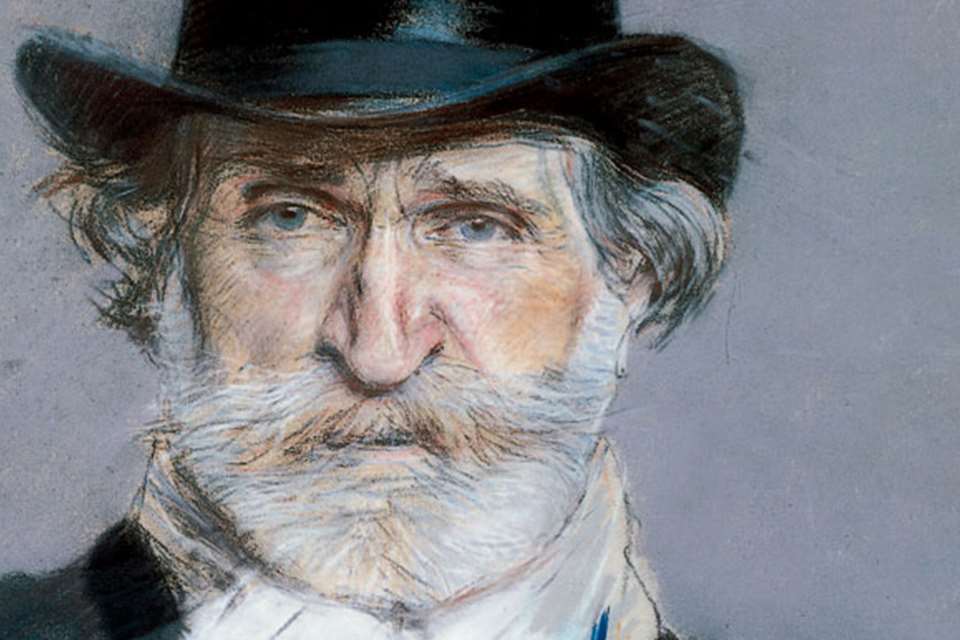Marina Viotti interview: ‘My aim is to try to change the image people have of classical music and opera’
Colin Clarke
Friday, September 2, 2022
Marina Viotti is a remarkable artist, with a fine, flexible, natural mezzo soprano voice that encompasses opera, jazz and metal. Having rediscovered her roots as a classical musician, she is taking the opera world by storm
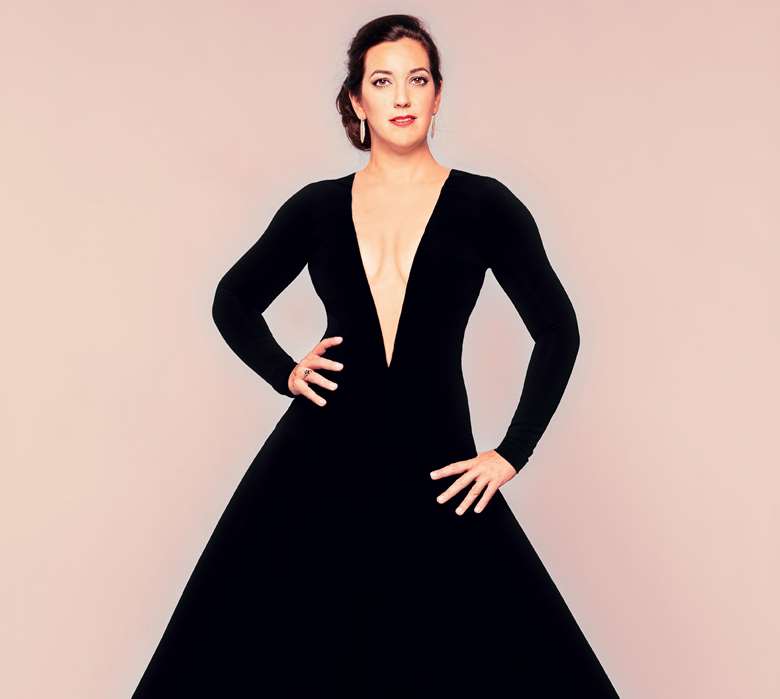
Marina Viotti's story is fascinating. The mezzo-soprano has an affinity with musical styles that range from symphonic metal and jazz to opera. Though her journey to the operatic stage is far from traditional, she is from a family of classical musicians: her father, Marcello Viotti was an acclaimed conductor who specialised in opera, and her mother Marie Laurence is a former violinist. Born in Switzerland, she was raised in northern France, surrounded by opera: ‘If you watch the videos when we were kids,’ she says, ‘there is opera all along. We were staging stuff’). The urge to be a singer emerged at the tender age of eight. ‘My parents never told us to do music, but all four children wanted to. I wanted to sing, but my parents said, “It's too early! Play the flute, it's the same breathing technique!".’ Playing in an orchestra, aged 16 she was invited by a horn player to a metal concert. Things were never the same again.
Until that moment Viotti listened almost exclusively to classical music, with ‘maybe a bit of French chanson which my father liked, and a bit of old rock and some jazz.’ So her first encounter with metal opened her ears to something quite different: ‘I was asking myself, ‘What is it - noises and screams? It was symphonic metal, metal music plus a huge orchestra and choirs created via a keyboard, with a lyrical opera singer in the middle of it all. This is epic, and it's the best of all worlds.’ Viotti became the bass player in her friend's band, and while they were looking for a singer, stepped in to provide the vocals - which is where she stayed.
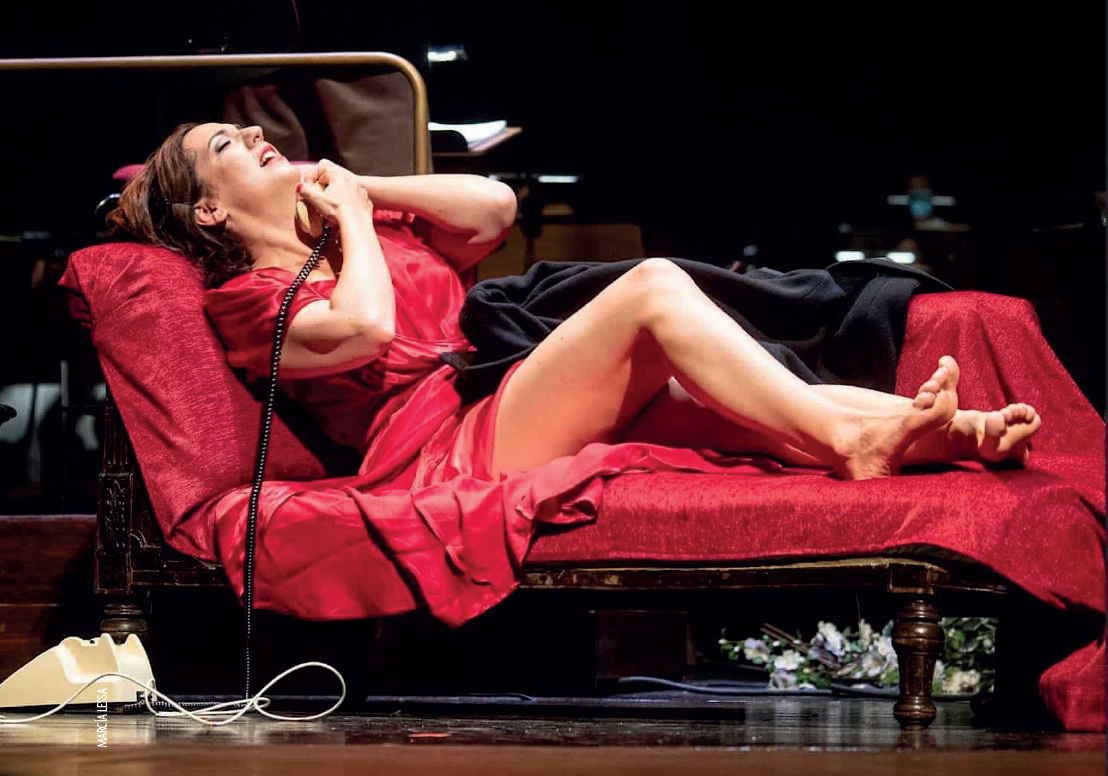
As Elle in Poulenc's La Voix humaine with the Gulbenkian Orchestra © MARCÍA LESSA
The inevitable question: what impact does singing metal have on the voice? ‘In my band I was singing and screaming - “growling", we say - and at the first concert after 20 minutes I was voiceless. So, I had to find a technique, a placement for my voice that allowed me to do both. Without knowing, I chose an operatic technique. I just imitated something I'd been hearing all my life and realised that it did not make me tired. The screaming became a breathing technique, and I could sing for hours.’
Performing with a symphonic metal band was Viotti's first stage experience. It was the immediate response she got from the audience that appealed. So her first classical concert came as a shock when she started speaking to the assembled throng. ‘I was asking if they were OK … and at first they were surprised, but they responded so well. I always speak to my audience now.’
When her father died unexpectedly in 2005 after suffering a stroke, classical music (with which he was associated) became a trauma. ‘Metal music helped me to express the sadness, the anger. It was my therapy. I completely stopped listening to classical music for five years. I moved to Lyon, studied literature and philosophy, then went then to business school for cultural management. My first internship, chosen by the school, was at the Aix-en-Provence Festival. I had to face classical music again.’
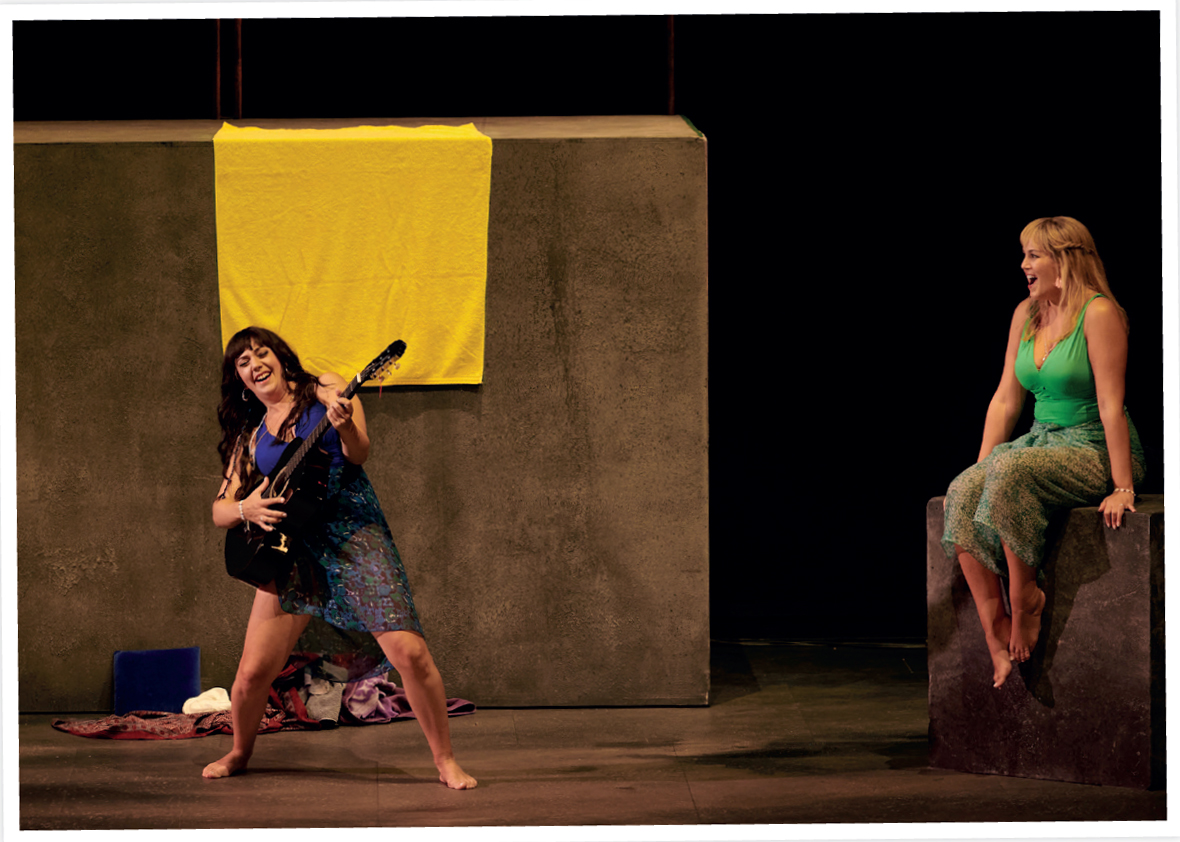
As Dorabella in Così fan tutte at the Berlin State Opera, with Federica Lombardi as Fiordiligi © MATTHIAS BAUS
During a visit to Vienna, she had another transformational encounter when she saw Verdi's Simon Boccanegra, an opera her father conducted so often she knew it by heart. ‘It was my first time at the opera since my father's death, and it is a story of a father and daughter. I left the theatre in tears. On that day, I decided to change everything.’
Aged 25, Viotti packed up her life in France, left the metal scene and moved to Vienna, in order to become an opera singer, starting from sctratch, ‘which was a big gamble. I knew nobody there. I still looked Goth-Punk-Metal, and the traditional Viennese opera world wasn't open-minded to that. And I was too old for the music schools. Nobody wanted me.’
One teacher, Heidi Brunner, agreed to give her private lessons if she took an X-ray of her vocal cords. ‘They were perfect! I sang one of my metal band numbers, and Ms Brunner realised I had a lyrical technique already there.’ Viotti recalls another of her singing teachers, Swiss mezzo Brigitte Balleys, who was ‘like my guardian angel’. It's thanks to her third teacher, Argentine tenor Raúl Giménez, that she has a high register (‘after one lesson with him I was a high mezzo. One. Lesson!’). Another important figure is Alessandra Rossi, her Italian bel canto teacher. The result was a progression of teachers rather than one primary influence: ‘I mixed all those techniques together. And now it's me!’
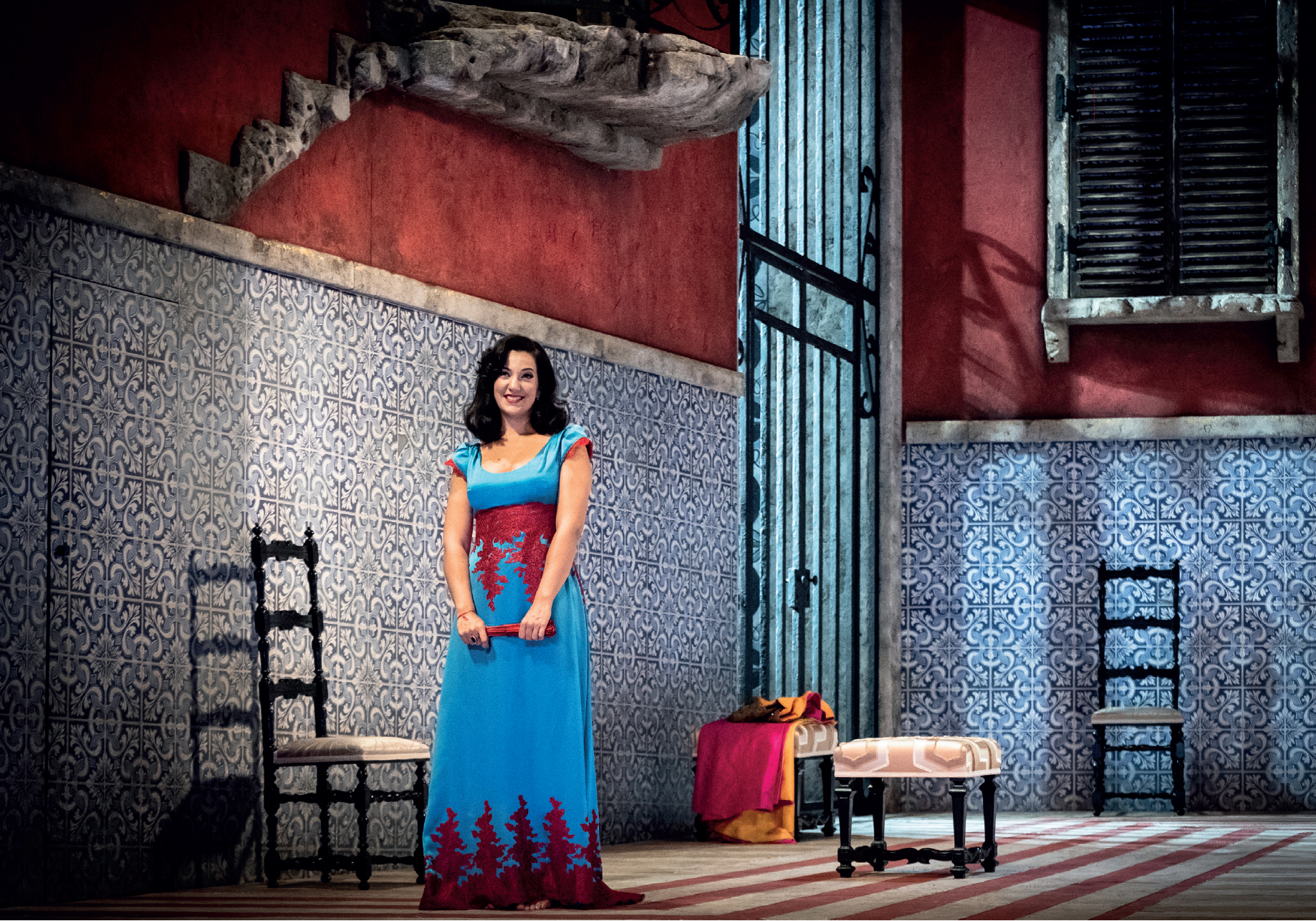
As Rosina in II barbiere di Siviglia at the Soirée Lyriques in Sanxay, France
Viotti's Swiss origins, meanwhile, have stood her in good stead. Lausanne, Lucerne and Geneva gave the budding opera singer her first jobs. ‘Without Switzerland, I would be nowhere. That's why even when I do bigger houses, I will always go back there.’ Despite success at La Scala (she sang the role of Maddalena in Verdi's Rigoletto there this summer) America is yet to beckon, although during lockdown Dallas Opera launched a video channel ('Netflix for opera’). They offered her (via Instagram!) a film, giving her carte blanche: ‘That was a huge gift. I did a documentary about creativity, and the movie is now out in their platform.’
Competitions have been few and far between because of age limits. ‘One of the few I could do was Operalia, and then the Councours de Genève and other events Switzerland, but that's it. The circuit is an interesting experience because it's like a giant audition. If you are not super-ready, they will remember you as an average singer. There is a huge network, and the all speak to each other.. ‘
The Rossini in Wildbad Festival in southern Germany was a turning point. Her Arsace in Aureliano in Palmira was recorded by Naxos, and she is the jewel of the set). ‘That was the best school I had for bel canto and Rossini style. The quality is amazing, and you are surrounded by specialists in this repertoire. Wildbad becomes an Italian city for the summer months. I did my first big role there, Italiana in Algieri (Isabella). And I won the bel canto prize: They give one prize per year to one of the singers."
The pandemic struck at an opportune time for Viotti, whose career was going into overdrive, but ‘I didn't notice’. Here was a pause, with time to reflect. Part of that reflection might be on career highlights so far. And it's not Rossini… ‘One of the strongest experiences for me so far was La Voix humaine. I performed it in Portugal in the middle of the pandemic, because Lisbon was not yet closed and my brother (the acclaimed young conductor Lorenzo Viotti) is the music director of the Gulbenkian Orchestra. Vincent Huguet was the director. I love Poulenc, this was my first real dramatic piece as well. We started with cabaret because we wanted Elle to be a stronger character, so I'm singing Edith Piaf, and then we moved on to La Voix humaine’.
Since then, Viotti has been creating recitals staged like a show: ‘I involve the audience, and the musicians, in the story. One such ‘staged recital'is entitled Melankhôlia - In Darkness Through The Light, in which Viotti collaborates with lutenist Vincent Flückiger and sound engineer Frédéric Chappuis: ‘the lute doubles as electric guitar, and I'm playing the flute and singing John Dowland, mirroring his music with songs of today. We arranged everything for this weird constellation. I explore this other side of me - the deeper emotions. I'd like this recital to go to metal festivals, and to Baroque festivals as well. It's a hybrid - and I like hybridity.’
Viotti's exploration of the darker side of life even extends to Rossini comedy. We met in Sanxay, France, where she was singing Rosina in Il barbiere di Siviglia, a production directed by Pierre-Emmanuel Rousseau and conducted by Marc Leroy-Calatayud. It wasn't all lightness and froth. ‘It's actually terrible that this girl has been kept locked up for so long. She has no access to the outside world. It's important to keep the fun, but it's important to find the sincerity and the authenticity of Rosina's life.’
What really comes across with Viotti is an underlying, ferocious curiosity that coalesces around the characters she portrays. I wonder where it's going next? ‘I think I will never do only opera. I need to explore, to build bridges, because if I only sing opera, the stage director and conductor tell you what to do. I see myself having my own festival at some point, like Cecilia Bartoli (who is an entrepreneur, like me). My aim is to try to change the image people have of classical music and opera, and all the projects I do, all the different types of music I'm involved with, nourish each other - it's symbiotic. Without one or the other, I am not whole.’ Hence a collaboration with the multidisciplinary French artist Inès Halimi, who also embraces both Classical and jazz. Halimi composed a piece for rock band and Baroque orchestra on a text by Camus (Caligula). This mix of Baroque and metal might well furnish Viotti's next project. ‘And she's a woman, so I'm really happy.’
My aim is to try to change the image people have of classical music and opera, and all the projects I do, all the different types of music I'm involved with, nourish each other
Viotti's debut disc, released this month, is with Christophe Rousset and Les Talens Lyriques: A Tribute to Pauline Viardot celebrates the musical life of the celebrated Parisian mezzo-soprano, composer and salonnière (1821-1910) whose 200th birth anniversary was celebrated last year. The disc came about at Rousset's own instigation. The two met in Bilbao, preparing for performances of Il Turco in Italia. Viotti and Rousset were the only two brave enough to go to restaurants while the pandemic was still running its course, so the two naturally bonded. The conductor asked if Viotti could sing Baroque repertoire. Cue an intense hour of coaching on 10 bars of a recitative from Armide. ‘It was like a masterclass, and I realised there's a whole world I don't know yet. And I think Christophe discovered me in this moment. A year later, he called me out of the blue and said, “OK, I know what CD we will do together". We'd never even spoken of doing a CD together until then! I had in fact told him in Bilbao I didn't want to do a typical opera arias disc because I'd find it boring. I need a story.’
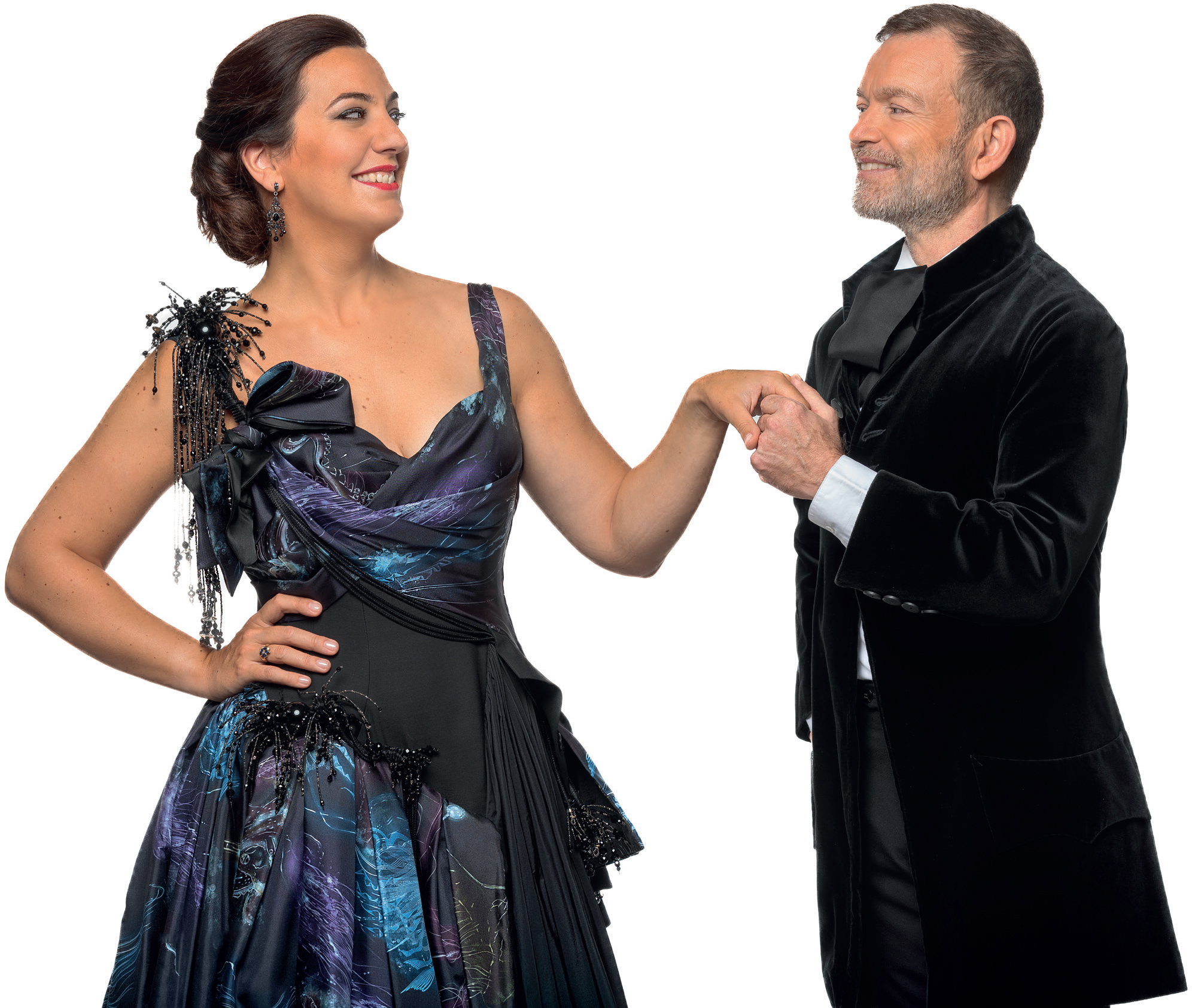
Capturing the spirit of Pauline Viardot on her new disc with Christophe Rousset © ERIC LARRAY
Viotti is passionate about this. Her intention on the new disc is to capture the spirit of Pauline Viardot and her time, with music ranging from Gluck's Orféo et Eurydice through Rossini, Donizetti, Bellini, Gounod, Halévy, Massenet, Berlioz, and ending with Saint-Saëns’ Samson et Dalila: ‘She's incredible, and this is the perfect moment to make her well known again. She was such a free spirit for the time, living with her husband and her lover in the same place - this is great! She was composing and singing different stuff, from mezzo to contralto to soprano; and she was the muse of so many amazing writers and composers. She also came from a family of musicians - that resonates with me. We have so much in common. I also like the fact that Viardot was not a show-off mezzo but focused on the emotions in the music - and that's totally me.’ For Viotti, the text will always prevail. As she puts it, ‘There are two teams in singing: Team Voice and Team Text. I am Team Text, because I always think I'm talking about something when I sing.’ Which makes perfect sense when one hears how Viotti uses even the most florid coloratura as an expressive vehicle in a narrative - it is so free and thoughtful.
A big difference for Viotti on the new disc is working with the period instruments of Les Talens Lyriques. ‘Christophe said why don't we do Dalila in a different way - witty, fresh. So, I changed my way of singing, and it's interesting, a different colour. Dalila's ‘Amour viens aider ma faiblesse’ was the first aria we sang. From that moment, the disc went in that direction. I sing Rosina in The Barber of Seville so much, and Christophe asked me, ‘Don't you want to try something different?’ So I added a lot of embellishments and variations. He made me go with my voice in ways I didn't know I could. And the orchestra, the transparency of sound in Les Talens Lyriques helped a lot in this direction.’ Rousset, incidentally, talks of Viotti in glowing terms: ‘It's a real pleasure for a conductor to have such a flexible singer,’ he told me.
At the heart of Viotti's singing is a sense of spontaneity. Her ornaments sound almost improvised on the Viardot disc. ‘That comes from my jazz experience. For me, singing ornaments and singing jazz are kind of the same - you need to find a freedom. In the extracts from Semiramide, Viotti and Rousset as an experiment went away and wrote different sets of ornamentation: Viotti's were more traditionally coloratura and high; Rousset's were low. ‘It's interesting - a mix of his musicality and mine.’
The future is bright and busy for Viotti. Next year, the floodgates open with Dorabella in Bilbao (January 2023), Nicklausse in Les Contes d'Hoffmann at La Scala (March 2023) and Stéfano in Roméo et Juliette (Gounod) at Paris Opera (June/July 2023). Meanwhile, this September, she will receive the prestigious Swiss Music Prize awarded by Switzerland's Federal Office of Culture: ‘They reward not only the talent, but also the personality of someone who is trying to make a change.’ What would be her dream role? ‘I need to do Rossini's Tancredi - it's perfect for my type of voice. And another dream is to do the Jean-Pierre Ponelle 1987 staging of Rossini's Italiana in Algeri. It has been revived so often that I feel as if I've been seeing it my whole life. It's such a funny production.’
Rehearsals for the August run of Il barbiere at the Soirées Lyriques in Sanxay are about to get underway again. It's a coup to have Viotti among the young cast, with her tremendous energy and comic flair. I have one final question: as someone who has forged a hugely successful career in opera relatively late in the day, what would be her advice be for young singers? ‘Always listen to your own voice. It's a marathon, not a sprint. You can't imagine how many times until I've said no to Carmen. Now I've said, yes - in 2024. We are athletes, and we cannot sing every day. Ideally, have another qualification. When the pandemic happened, a lot of professional performers were left helpless. Also, when you have a teacher who has nothing more to teach you, go to another one. It's ok!’ Sound advice indeed.




